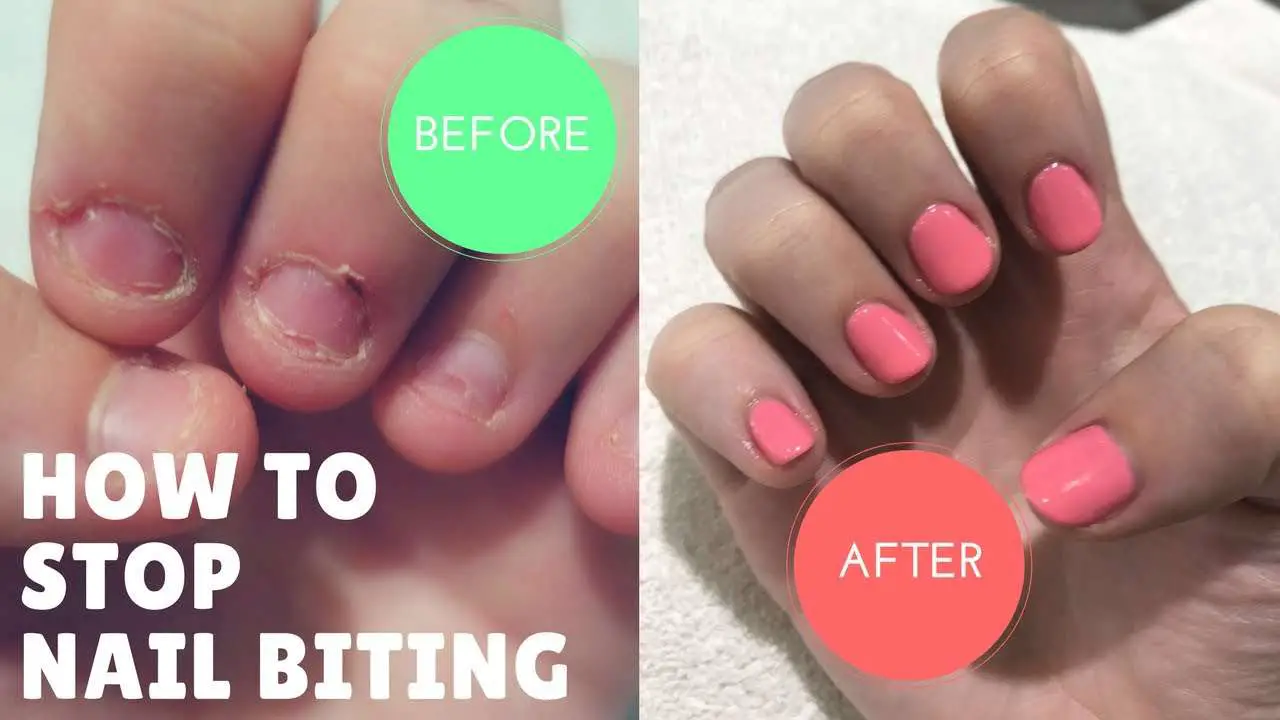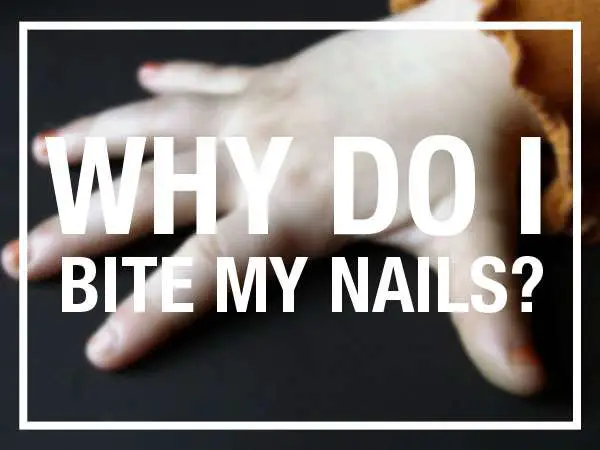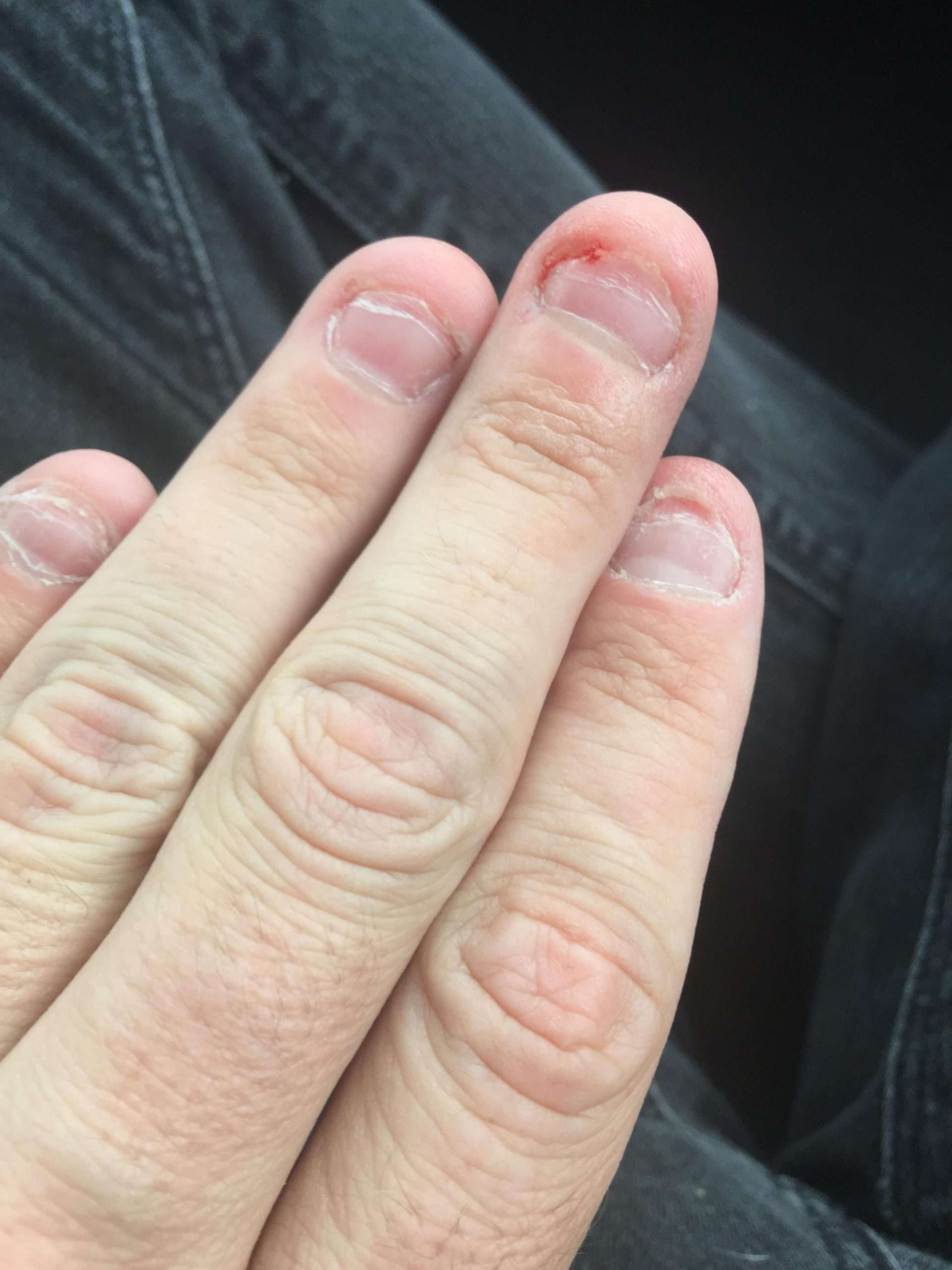What Do You Do With Your Nails After You Bite Them Off
What do you do with your nails after you bite them off?
Get up and throw them in the trash.
Throw them on the floor.
Put them in my pocket with the intention of throwing them away, but I usually forget, so my pockets are filled with nails.
Save them for an art project.
Something else. Will say in the comments.
How Common Is Nail Biting
Nail-biting is thought to be the most common of the body-focused repetitive behaviors. The most commonly cited research studies estimate that 20 to 30 percent of the population bite their nails. Children and adolescents are most prone to nail-biting, with some estimates suggesting that almost 40 percent of children and nearly half of teenagers bite their nails.
How To Stop Children From Biting Their Nails
Steven Gans, MD is board-certified in psychiatry and is an active supervisor, teacher, and mentor at Massachusetts General Hospital.
If your child bites their nails, they’re not the only one. Around 50% of children between 10 and 18 bite their nails at least occasionally, and for many kids, the habit starts even younger.
Its one of the most common nervous habits, a category that also includes hair-twisting, nose-picking, and thumb-sucking. Formally, it’s characterized as a body-focused repetitive behavior.
Don’t Miss: How To Safely Remove Gel Nails
Why Do I Bite My Nails And How To Stop Naturally
Why do I bite my nails and the best natural way to stop this bad habit? Nail biting is a bad habit that affects our health. Nail biting how to get rid of it? It has happened to everyone at one point or another in life that someone bites their own fingernail, but some people do it constantly and out of control.
Nail biting can easily become a habit, which is then difficult to forget and get rid of. In todays article, we will focus on the ways you can most easily get rid of nail biting.
Why Do People Bite Their Nails

You might not know this, but nail biting falls under a list of behaviors known as body-focused repetitive disorders , which are those little habits we have that, when done often enough, can cause harm. As SELF previously reported, its not entirely clear why some people have BFRDs, but there are known triggers. SELF previously reported that those triggers fall into five main categories: There are sensory triggers, which might be anything that evokes the senses . You may be triggered by certain thoughts or beliefs . You could bite your nails when you face something called a motor trigger, which involves postures and movements that you make . Even certain places might make your nail nibbling more prevalent .
Recommended Reading: Get Nail Polish Off Clothes
Tips To Help Break The Habit
Until more is known about nail biting and what causes it, it can be difficult to know the best things to do to break the habit, but here are a few strategies that can help:
Trim your nails regularly so you dont have anything to bite.
Paint your nails with bitter-tasting polish so biting becomes associated with a nasty taste.
Get a manicure! If your nails are pretty, youll be more motivated to keep them that way.
Swap the nail biting habit with a more harmless way to fidget, like silly putty or a stress ball.
Figure out your triggers. When you know what sets off the nail biting, you can plan ahead and do something different.
Make stopping a gradual process. Choose one nail at a time to stop biting, and maybe cover it so you physically cant bite it. Add more fingernails to the bite ban until there arent any left!
Can Medication Help With Excessive Nail
Medications are not often used for nail-biting, though some patients prescribed SSRIs for anxiety and depression find that the medication reduces their nail-biting somewhat. Some small studies suggest that N-acetylcysteine, a supplement also being investigated for trichotillomania and excoriation disorder, is more effective at reducing nail-biting behaviors than a placebo, though more research is likely needed.
You May Like: Does Vitamin E Kill Nail Fungus
How Long To Wear Fake Nails To Stop Nail Biting
Generally speaking, it’s best not to wear any particular set of nails for longer than three or four weeks. “I think getting a new set repeatedly can help with biting, and one can see an improvement on their natural nail within a month if theyre taking care of the nails underneath the fake nails,” Grant says.
It takes the natural nail anywhere from three to six months to grow from the cuticle to the tip of your finger. During that time, you will have to have what are known as “fill-ins” to cover the gap at the base of your nail when the growth begins. Initially, it will be quite rapid, so expect to have your first fill in within about two weeks of the set of nails being put on. After that, it will slow down a little bit. When the nails come off, use a strengthener like OPI Natural Nail Strengthener and make sure to file them regularly to maintain shape.
As Diller explains, waiting for the natural nail to grow beneath the fake nails is the best way to ensure you break your nail-biting habit. “It usually takes about 90 days to change most habits , but it depends on how long-standing the habit is,” adds Diller.
Choose fake nails in a bright color, like red or orange, as an added alert to not bite your nails.
Some Scientists Think It’s Related To Ocd
There was a small shift in the world of nail biting in 2012. That was the year that the American Psychiatric Association decided that it actually counted as a form of “pathological grooming,” alongside such behaviors as plucking out your eyelashes or obsessively picking at spots, and therefore deserved to be part of the pantheon of behaviors associated with OCD, or obsessive compulsive disorder.
It’s not an uncontroversial opinion, though. Some psychologists accused the APA of scaremongering, and amping up the importance of what is, for many people, a simple habit of preoccupation and stress relief, rather than a serious failure in impulse control. Serious nail biting as a psychological problem and physical disorder does exist, but the argument over whether even minor cases are still pathological is still ongoing.
Read Also: How Much Money Do Nail Techs Make
Why Do I Bite My Nails And How Do I Stop
Sometimes, nail biting can be a sign of emotional or mental stress. It tends to show up in people who are nervous, anxious or feeling down. Its a way to cope with these feelings.
You may also find yourself doing it when youre bored, hungry or feeling insecure. Most nail biting is automatic you do it without thinking.
Why Do I Bite My Nails And Do I Have Onychophagia
Many of us bite our nails once in a while, but if the habit develops into a long-term or severe problem its known as a condition called onychophagia.This is thought to be common in children and young adults, with studies suggesting between 20 – 33 per cent of children and around 45 per cent of teenagers bite their nails . Its thought that many children and teenagers grow out of the habit, but some continue with nail biting as adults .The most obvious symptom of onychophagia is the visible damage it causes. This includes damage to parts of the nail including the following:
-
The nail plate
-
The proximal nail fold
-
The lateral nail fold
-
The perionychium
-
The hyponychium
Besides this tissue damage, people who bite their nails may also experience a range of psychological issues, such as stress or tension before biting, a feeling of relief or even pleasure after biting and also often embarrassment and guilt because of the physical appearance of their nails.Indeed, onychophagia has been classified as a body-focused repetitive behaviour thats part of a specified obsessive-compulsive and related disorder in the fifth edition of the Diagnostic and Statistical Manual of Mental Disorders , a diagnostic handbook used by many doctors published by the American Psychiatric Association. This classification places nail biting alongside other body-focused repetitive behaviours such as trichotillomania and dermatillomania .
Don’t Miss: Removing Nail Glue
What Steps Can Someone Take On Their Own To Reduce Nail
Hiding one’s nails or making them unpleasant to biteby cutting them short, painting them with bitter-tasting polish, or wearing gloves or mittenscan make it more difficult to engage in the behavior. Its also helpful to identify ones triggerthe emotion or situation that makes someone most prone to bitingand developing coping mechanisms that replace nail-biting with a healthier alternative. For example, someone who bites while bored could play with a fidget toy in situations where theyre likely to be bored someone who bites when anxious could squeeze a stress ball or engage in a brief relaxation exercise instead of biting.
References
Why I Bite My Nails

Ive been biting my nails as long as I can remember and Im 50 as Im typing this. Its a gross habit but the most difficult part of stopping is that many times I dont even know when Im doing it. Its subconscious to the point where I barely even consider it anymore.
These days with covid, Im more careful about putting my fingers in my mouth and truth be told Im more of a nail picker than nail biter. Why do I do it though? I actually had to think about it in detail to be honest as I dont actually know why I spend so much time and effort doing it. For me, it boils down to a few key reasons.
You May Like: How To Remove Nail Glue
Q: When Is Nail Biting A Problem That Needs Medical Attention
A: If nail biting causes physical harm and psychological distress, then professional treatment is necessary. Usually, the person knows the behavior is problematic, but they cant control it on their own. It is important to seek help if the behavior is affecting mental and physical health:
- Damage to the nail, cuticle or surrounding skin.
- Psychological damage .
- Relationship problems.
Why We Bite Our Nails Instead Of Other Alternatives
Of course, this theory still prompts a more basic question: why does biting your nails or plucking your hairs or picking at your skin provide pleasure or distraction in the first place? Why do so many people become addicted to these grooming habits, rather than, say, balling their hands up into fists?
One possible answer relates to the finding that people with body-focused repetitive disorders tend to be perfectionists. It might be that ripping off an oddly shaped nail can provide a satisfying sense of perfection for the biter and the quest for this satisfaction eventually gets out of control.
lots of other animals groom excessively
It’s also possible that the uncontrollable urge to groom excessively goes much deeper than we realize. Lots of other animals, after all, seem to do it, too: some cats lick themselves excessively, leading to fur loss, while some horses bite their own flanks over and over. Perhaps the urge to groom past the point of usefulness to the extent that we actually cause damage to ourselves is a trait that can be traced way back to the evolutionary ancestors we shared with these other mammals.
Finally, there’s a more mundane explanation. Maybe we just bite our nails because they’re there. Psychologists believe that you can get psychologically addicted to pretty much anything: any activity that provides a reward can reinforce itself over time.
Don’t Miss: Varisi Nail
Nail Biting Is Actually The Entry Of Millions Of Bacteria
Among these microorganisms, most may not be pathogenic, but it is enough to get our hands dirty or washed inappropriately only once, in order to introduce a certain harmful microorganism, so that an infection occurs.
According to research, people who regularly bite their nails have a particularly high risk of colds, flu, and gastrointestinal diseases.
You are probably aware that the hands, ie the palms are the source of a huge number of microorganisms that we collect from the environment.
But did you know that most of them usually accumulate under the nails? Why?
We usually touch different surfaces with our fingertips.
The parts under the nails are a kind of recesses suitable for collecting different types of debris and are usually wetter and warmer .
Additionally, these parts are often missed when washing your hands with soap. A 2007 study found that pathogenic E. coli bacteria were often found under the nails.
To make the situation even more unpleasant, in this way we can transmit our pathogens if we have an infection or are carriers.
Q: Are There Specific Triggers For Onychophagia
A: The behavior is typically automatic people dont realize theyre doing it. Chronic nail biting often has a self-soothing quality , so people may use it as a coping mechanism. Sometimes, a hangnail or nail imperfection could spur someone to excessively groom the nail. Their goal is to improve the look of the nail, but unfortunately, the nail often ends up looking worse. They dont intend to self-harm its a grooming behavior run amok. Other triggers could be boredom, needing to concentrate or a stressful situation.
You May Like: Dollar General Acrylic Nails
Trim Or Manicure Your Nails Often
Long nails may be hard to resist, so keeping them trimmed is a good idea. Set a particular day and time every week for your trim, and take care of hangnails and ragged edges so youre not tempted to bite them.
Another option is to get regular professional manicures. Spending the money and knowing that someone is going to check your nails soon may keep you from reverting to the habit.
Choose only licensed salons and manicurists who properly sterilize tools, so as to prevent fungal nail infection.
Psychology Of Nail Biting
Many people bite their nails at some point, especially as children. Its a type of body-focused repetitive behavior that goes by the clinical name of onychophagia.
Theres a spectrum of nail biting. It can range from an occasional benign behavior to a deeply ingrained self-mutilative behavior.
Many people who begin biting their nails as children eventually outgrow the habit. For others, it becomes a lifelong habit that can be extremely difficult to quit.
Lets take a closer look at why people bite their nails, how to change the behavior, and when its time to see a doctor.
Nail biting typically begins in childhood and may accelerate during adolescence. Its not always clear why someone develops this particular habit, but once it starts, it can be difficult to manage.
Read Also: How Do You Get Dip Nails Off
Wear Gloves And Get Rid Of Nail Biting
For passionate bites that can not be weaned otherwise, experts advise wearing gloves. In summer it is not very feasible, but during the rest of the year, it is desirable to practice.
Example: You know you bite your nails while watching movies. Well, the next time you sit down to watch, put on your gloves.
Yes, you will not be able to eat popcorn, but it will save a few calories. The brain will understand that you are wearing gloves, so you probably will not even try to bite.
But even if you bring your nails to your mouth, you will automatically pull your hands.
Nail Biting Ages 6 To 12

Why does my child bite his nails?
Children bite their nails for many reasons — out of curiosity or boredom, to relieve stress, to pass the time, or from force of habit. Nail biting is the most common of the so-called “nervous habits,” which include thumb sucking, nose picking, hair twisting or tugging, and tooth grinding. Nail biting is most common in high-strung children, tends to run in families, and is the most likely of the nervous habits to continue into adulthood. About 30 to 60 percent of elementary school students and 20 percent of adolescents bite their nails, at least for a time between one-quarter and one-third of college students say they still bite their nails.
Is my child’s nail biting a sign of excessive anxiety or some disorder?
Growing up is an anxious process, and many of the tensions and pressures are invisible to parents. If your child bites moderately and unconsciously , or if he tends to bite in response to specific situations , there’s probably nothing to worry about.
If you know or suspect that a particular situation is making your child anxious — a recent move, a divorce in the family, a new school — make a special effort to help him talk about his feelings.
If, on the other hand, the habit doesn’t seem to pose any physical or psychological threat, ignoring it is the best way to ensure that down the road your child will either stop on his own or ask you to help him quit.
How can I get my child to stop biting his nails?
References
Read Also: How To Remove Contact Lenses With Nails
Advance Nail After Nail
One of the methods of giving up involves protecting the nails one by one. Choose one finger and tell yourself that you will not bite it for 3 days.
After 3 days, select another finger and continue to protect the nails of those fingers. So you will gradually give up the habit.
And when you see how beautiful the fingernails you have managed to protect from the biting look, you will be even more motivated to keep giving up.
